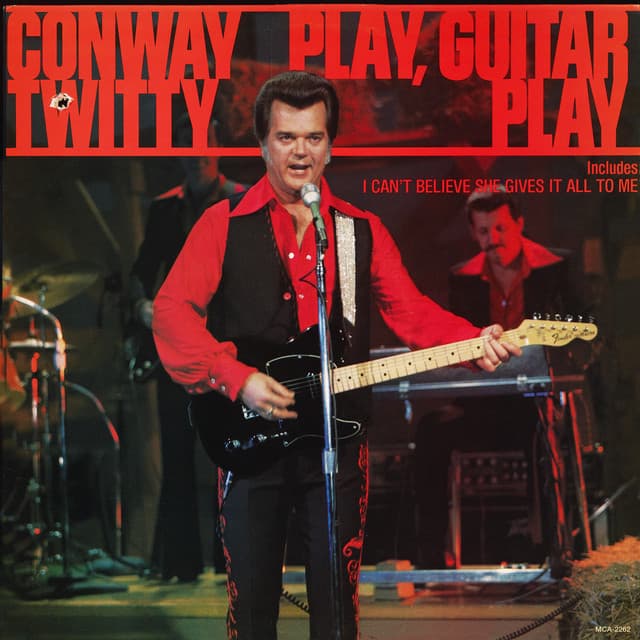
A wandering soul’s plea to the music that takes him back home.
In the vast and storied history of country music, few voices resonate with the profound, soul-stirring depth of Conway Twitty’s. He was a master of a certain kind of song, one that didn’t just tell a story but painted a picture, evoking emotions so real you could almost touch them. In 1977, from the album of the same name, came a track that was a perfect testament to this gift: “Play, Guitar Play.” While it may not have the same recognition as his signature hit “Hello Darlin’,” it was a commercial and critical success in its own right, a testament to Twitty’s enduring power as a country artist.
Released as the title track and second single from his album Play, Guitar Play, the song was a strong performer on the charts. It became Conway Twitty’s 19th number one single on the Billboard Hot Country Songs chart, a monumental achievement that cemented his place as a country music icon. It held the top spot for a week and spent a total of 13 weeks on the charts, a clear indication of its widespread appeal. The song resonated deeply with the country audience, a loyal fanbase that understood the complexities and raw emotion that Twitty so often poured into his music.
The song’s story is a powerful, yet simple, one of regret and homesickness. Written by Conway Twitty himself, the lyrics are a direct, heartfelt conversation with his own guitar. He’s not talking to a person, but to the instrument that has been his constant companion, his means of escape, and his connection to the life he left behind. The song opens with a plea: “Play, guitar play, take me back to yesterday / Let me see cotton growing in the fields.” This isn’t just a nostalgic tune; it’s a window into the mind of a man who has traveled far from his roots, haunted by the memory of a past he can’t get back. The narrative reveals that he left home after doing “that awful thing I done,” a vague but heavy burden of a mistake that forced him to run, never to return. He can’t face his family, so he asks his guitar to sing his story for him, hoping they might “read between the lines in my song.”
For a certain generation, especially those of us who came of age with this kind of music, “Play, Guitar Play” touches a deeply personal chord. It speaks to the universal human experience of making choices we can’t undo and living with the quiet consequence of our past. It’s the sound of a late-night drive home, the glow of the dashboard lights illuminating a face lined with a lifetime of stories. It evokes memories of a time when men of a certain type—strong, silent, and often carrying a secret hurt—found solace not in confession, but in a song. The melancholy in Twitty’s voice, with its characteristic low rumble and impeccable phrasing, is what makes the song so powerful. It feels authentic, as if he’s truly baring a piece of his soul.
In an era of flashy showmanship, Conway Twitty stood apart. He wasn’t a flashy performer, but his raw talent and emotional depth were undeniable. “Play, Guitar Play” is a perfect example of this. It doesn’t need a complicated arrangement or a dramatic chorus to make its point. It relies on the simple, honest beauty of a man, his guitar, and a story that’s as old as time itself—the story of a lost son, a regretful brother, and a man who knows he can never truly go home again. It’s a song that proves that sometimes, the most profound and emotional conversations are the ones we have with ourselves, with the only witness being the music we love.